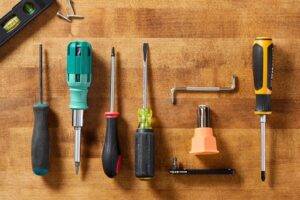When it comes to choosing the right tools for your DIY projects, Linus Tech Tips has got you covered. In this comprehensive guide, we will delve into the world of screwdrivers, helping you make an informed decision about which one to add to your toolbox. Whether you’re a seasoned DIY enthusiast or a newbie looking to start your journey, this guide will be your go-to resource for everything you need to know about screwdrivers.
Screwdrivers are among the most basic yet essential tools in any toolbox. They come in a variety of shapes, sizes, and materials, each designed for specific tasks. Linus Tech Tips understands the importance of having the right tools for the job, and that’s why we’re here to guide you through the process of selecting the perfect screwdriver.
Types of Screwdrivers

Before we dive into the nitty-gritty details, let’s take a look at the various types of screwdrivers available on the market. Understanding these types will help you make an informed choice.
1. Flathead Screwdrivers
- Flathead screwdrivers, also known as slotted screwdrivers, have a single, flat blade that fits into the straight slot of a screw.
- Ideal for simple tasks and commonly found in many household toolkits.
- Perfect for working on screws with a single horizontal groove.
2. Phillips Screwdrivers
- Phillips screwdrivers have a cross-shaped tip that fits into screws with a corresponding cross-shaped indentation.
- Designed to provide better torque and prevent cam-out.
- Widely used in electronics and automotive applications.
3. Torx Screwdrivers
- Torx screwdrivers are recognized by their star-shaped tips, which provide excellent grip and reduce the risk of stripping the screw head.
- Commonly used in precision electronics and machinery.
- Available in various sizes to match different Torx screw types.
4. Robertson Screwdrivers
- Robertson screwdrivers, also known as square-drive screwdrivers, have a square tip that fits into screws with square-shaped recesses.
- Popular in woodworking and construction applications.
- Prevents slippage and provides a more secure grip.
5. Hex Screwdrivers
- Hex screwdrivers have a hexagonal-shaped tip that fits into screws with hexagonal heads.
- Frequently used in assembling furniture, bicycles, and machinery.
- Offer better torque and stability.
Choosing the Right Screwdriver
Now that you’re familiar with the types of screwdrivers available, it’s time to choose the right one for your needs. Here are some factors to consider:
1. Screw Type
- Consider the type of screws you will be working with. Different screw heads require specific screwdrivers for optimal performance.
2. Screw Size
- Match the screwdriver size to the screw’s size. Using an ill-fitting screwdriver can damage the screw head.
3. Grip and Handle
- Ensure that the screwdriver has a comfortable grip and handle that fits well in your hand. This will reduce hand fatigue during prolonged use.
4. Material
- Screwdrivers are made from various materials, including steel, chrome-vanadium alloy, and more. Choose a material that suits your application and durability requirements.
5. Magnetic Tip
- A magnetic tip can be highly useful, as it prevents screws from falling and makes it easier to start and remove screws.
Maintaining Your Screwdriver
To ensure the longevity and performance of your screwdriver, follow these maintenance tips:
1. Keep it Clean
- Regularly clean your screwdriver to remove dirt, debris, and any residue that may affect its performance.
2. Store Properly
- Store your screwdrivers in a dry and organized toolbox to prevent damage and maintain their sharpness.
3. Replace Worn Screwdrivers
- Inspect your screwdrivers for wear and tear. Replace them when the tips are damaged or worn out.
4. Lubricate Moving Parts
- Apply a small amount of lubricant to any moving parts to prevent rust and ensure smooth operation.
In conclusion, Linus Tech Tips knows the importance of selecting the right screwdriver for your DIY projects. With the information provided in this guide, you are well-equipped to choose the perfect screwdriver that matches your specific needs. Remember to consider the screw type, size, grip, material, and other factors discussed here to make an informed decision. With the right screwdriver in your toolkit, you’ll be ready to tackle any project that comes your way.

